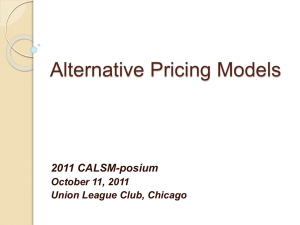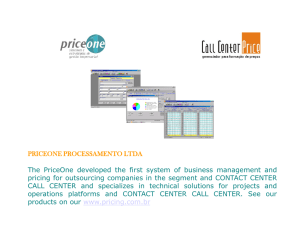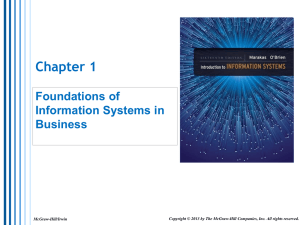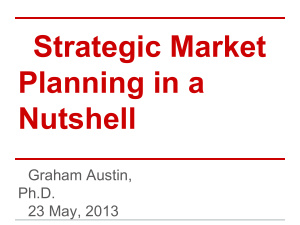Sustainable pricing system and how to expand access to medicines
advertisement
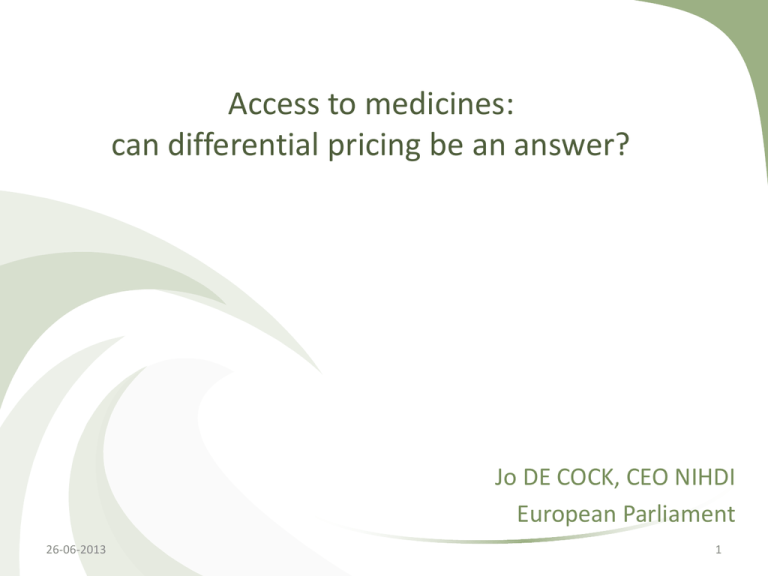
Access to medicines: can differential pricing be an answer? Jo DE COCK, CEO NIHDI European Parliament 26-06-2013 1 ACCESS TO MEDICINES: A MAJOR CONCERN 26-06-2013 2 ACCESS TO MEDICINES: A MAJOR CONCERN How to obtain greater access to medicines in recession-hit and poorer countries Bron: PatientView, 2013 26-06-2013 3 BELGIAN PRESIDENCY 2010 26-06-2013 4 COUNCIL CONCLUSIONS ON INNOVATION AND SOLIDARITY IN PHARMACEUITCALS 26-06-2013 5 COUNCIL CONCLUSIONS 6.12.2010 (NR.24) Examine, based on the principles of solidarity, economically viable and efficient approaches to facilitate availability and access to valuable innovative medicinal products throughout the EU, while respecting the principle of subsidiarity and the competencies of Member States, e.g. on affordability and sustainability of health systems. 26-06-2013 6 ANALYSIS OF 2011 SALES FOR 11 VALUABLE MEDICINES LAUNCHED IN THE EU IN THE PERIOD 2005- 2007 26-06-2013 7 A QUESTION OF SOLIDARITY • The sense of fairness and equity between Member States is being eroded. And without equity between Member States, how can there be equity between European citizens – State of the union, 11 sept 2012, by Jose Manuel Barroso, President of the European Commission 26-06-2013 8 CROSS-COUNTRY: EUROPEAN INITIATIVES 1. CAVOD – Clinical Added Value of Orphan Drugs • • 26-06-2013 Information needed to make (informed) decisions Approaches to understand what that information means 9 CROSS-COUNTRY: EUROPEAN INITIATIVES 2. MOCA – Mechanism of Coordinated Access to Orphan Drugs • Way to understand and make value judgments at time of pricing & reimbursement • Project managed by Belgium (NIHDI) • Final report published I/2013 26-06-2013 10 MOCA 26-06-2013 11 MOCA • Consensus on added value of cooperation between member states and stakeholders, supported by European Commission • Launching of a pilot to identify eligible drugs and initial common steps in assessment and appraisal. 26-06-2013 12 MOCA • Development of transparent value framework adding the societal value to the scientific evaluations. • Willingness to further discuss pricing and financial issues (e.g. differential pricing …) 26-06-2013 13 DIFFERENTIAL PRICING • Differential pricing implies that the manufacturer establishes a higher price for the drug in a richer country and agrees upon a lower drug price in a country where consumer demand is more responsive to price changes (Ramsey pricing – see WHO). 14 DIFFERENTIAL PRICING • The basic objective of price differentiation is to improve equality of access to innovative pharmaceuticals for unmet medical needs across Europe. 26-06-2013 15 DIFFERENTIAL PRICING • Companies in turn achieve a reasonable ROI and a higher volume as compared to today. 26-06-2013 16 REFLECTION ON DIFFERENTIAL PRICING • Scope: unmet medical needs • Problem statement: – Equal prices in all countries imply unequal access • Differential pricing: – Price reflects ability/willingness to pay of a country 26-06-2013 17 CODE OF CONDUCT – SOFT LAW APPROACH FOR ACCESS TO INNOVATIVE DRUGS • VOLUNTARY BASIS, protocol agreement between INDUSTRY and MEMBER STATES 26-06-2013 18 CODE OF CONDUCT – SOFT LAW APPROACH FOR ACCESS TO INNOVATIVE DRUGS • SCOPE for the application of the principle : “VALUABLE MEDICINES” – High added value – Unmet medical need – Market Authorization granted 26-06-2013 19 CODE OF CONDUCT – SOFT LAW APPROACH FOR ACCESS TO INNOVATIVE DRUGS • “LIKE FOR LIKE” Principle – PRICING • Transparent Ex factory price • Acceptable Return On Investment • Confidentiality of net prices • Price differentiation (no IRP nor ERP) 26-06-2013 20 CODE OF CONDUCT – SOFT LAW APPROACH FOR ACCESS TO INNOVATIVE DRUGS – WEIGHING • Clustering of countries with similar GDP, average income per capita • No linking to % spent on healthcare • Prevalence • Elasticity of the demand • Willingness to pay (incremental and marginal value) 26-06-2013 21 CODE OF CONDUCT – SOFT LAW APPROACH FOR ACCESS TO INNOVATIVE DRUGS • Transparency of timelines : EUROPEAN MARKET ENTRY PLAN (max. 2 years from MA) • CURRENCY STABILITY : prices in EURO - 24 months fixed exchange rates • EXTERNAL VERIFICATION BODY : independent Third Party 26-06-2013 22 EXTERNAL REFERENCE PRICING: IMPACT 26-06-2013 23 EXTERNAL REFERENCE PRICING: IMPACT 26-06-2013 24 EXTERNAL REFERENCE PRICING: IMPACT 26-06-2013 25 EXTERNAL REFERENCE PRICING (ERP) • ERP is not compatible with differential pricing – Prices determined ifo prices in other countries rather than ability/willingness to pay of a country 26-06-2013 26 EXTERNAL REFERENCE PRICING (ERP) • Participating countries need to agree not to implement ERP as a method of setting prices or to limit ERP to other member states of cluster 26-06-2013 27 PARALLEL TRADE • Would lead to unwillingness of companies to step into the process, as ROI seriously reduced by parallel trade • Introduction of possibility for public health exceptions for parallel trade 26-06-2013 28 TRANSPARENT MARKET ENTRY PLAN • Commitment of participating countries to apply differential pricing principles • Commitment of companies to launch medicines within 2 years of market access approval 26-06-2013 29 THANK YOU! 26-06-2013 30

